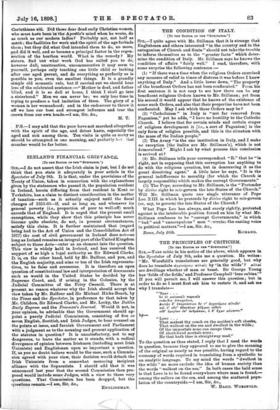THE PRINCIPLES OF CRITICISM [To THE EDITOR Or THE SPROTATOR."]
Sin,—Your critic in his notice of the above, which appears in the Spectator of Jnly 9th, asks me a question. He writes: "Mr. Worsfold's translations are generally good, but why does he translate clypoi444,:i; cciO■ca; by 'in the wilds' P atiAset are dwellings whether of man or beast. Sir George Young
has 'folds of the fields,' and Professor Campbell 'lone cabins.'" If you will permit me, I will answer this question; but in order to do so I must first ask him to restate it, and ask me why I translate-
"'Epats . . .
Ss ev 1.taxcucais irapEiais
vecipiaos ivvuxetiets,
forriis 5' irreprOvrtos gY r' typoY6Aois
sal IcOantrcov 04t1yos obEels
ails' Cip.eptom ?w' 6.00 ray, 6 8' ix"-" isilswYEP."
"Love . . .
That makest thy couch on the maiden's soft cheeks, That walkest on the sea and dwellest in the wilds; Of the immortals none can escape thee, Of short-lived mortals none; He that hath thee is straightway mad."
To the question as thus stated, I reply that I used the words in question, because they appeared to me to give the meaning
of the original as nearly as was possible, having regard to the economy of words required in translating from a synthetic to an analytic language. To my mind the words " dwellest in the wilds " no more exclude the idea of human society than the words " walkest on the sea." In both cases the bald sense is that Love is to be found everywhere where man is found,—
among the sailors on the sea, and among the scattered popu- lation of the countryside.—I am, Sir, &c., by— W. BASIL WORSFOLD.


































 Previous page
Previous page